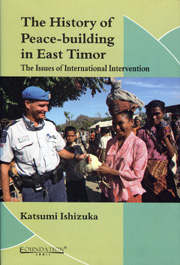Book contents
- Frontmatter
- Contents
- Preface
- Acknowledgements
- Acronyms
- Introduction
- Section 1 Historical Background
- Section 2 Policy Analysis
- Chapter III Review of the United Nations Transitional Administration in East Timor (UNTAET)
- Chapter IV UNMISET and Capacity-building in East Timor
- Chapter V A Judicial Aspect in Peace-building in East Timor: Response to Crimes against Humanity in 1999
- Chapter VI After the 2006 Crisis in East Timor: the Issue of the Exit Strategy and Capacity-building in UN Peace Operations
- Chapter VII Australia's Response to East Timor's Issues
- Section 3 Comparative Analysis
- Conclusion
- Bibliography
- Index
Chapter V - A Judicial Aspect in Peace-building in East Timor: Response to Crimes against Humanity in 1999
from Section 2 - Policy Analysis
Published online by Cambridge University Press: 26 October 2011
- Frontmatter
- Contents
- Preface
- Acknowledgements
- Acronyms
- Introduction
- Section 1 Historical Background
- Section 2 Policy Analysis
- Chapter III Review of the United Nations Transitional Administration in East Timor (UNTAET)
- Chapter IV UNMISET and Capacity-building in East Timor
- Chapter V A Judicial Aspect in Peace-building in East Timor: Response to Crimes against Humanity in 1999
- Chapter VI After the 2006 Crisis in East Timor: the Issue of the Exit Strategy and Capacity-building in UN Peace Operations
- Chapter VII Australia's Response to East Timor's Issues
- Section 3 Comparative Analysis
- Conclusion
- Bibliography
- Index
Summary
General Introduction to Justice for War Crimes in East Timor
On 20 May 2002 East Timor became a newly independent state following 24 years of Indonesia's illegal occupation. However, the state paid the cost of a huge anti-independence militia campaign which was launched in East Timor during the pre- and post-referendum periods. There is a significant difference in the crimes against humanity committed in East Timor between during the Cold War and during the referendum period in 1999. The latter events had been committed with much more attention from the international community than the former events. In particular, they were conducted in circumstances where UN contingents, namely UNAMET, were part of the selfdetermination process in East Timor. In consequence it was anticipated that international law would be fully applied to bring justice to the victims of the atrocities.
However, justice for war crimes in general has many problems. Gerry J. Simpson pointed out two problems in war crime trials; the problems of partiality and legality. Realpolitik is always evident at war crime trials, and it leaves war crime law open to accusations of bias, selectivity and partiality. Simpson claimed that each war crimes trial is an exercise in partial justice to the extent that it reminds one that the majority of war crimes remain unpunished. If Yugoslavia, why not Somalia; if Rwanda, why not Guatemala? The problem of legality in war crimes trials includes the issues of generality, vagueness, procedural fairness and defence.
- Type
- Chapter
- Information
- The History of Peace-Building in East TimorThe Issues of International Intervention, pp. 123 - 145Publisher: Foundation BooksPrint publication year: 2010

